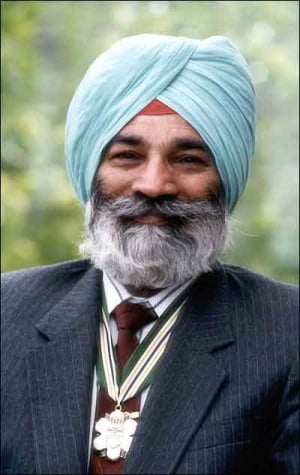Tara Singh Hayer
Tara Singh Hayer, O.B.C. (November 15, 1936–November 18, 1998) was a Sikh Canadian newspaper publisher and murder victim.
Hayer was born in Paddi Jagir, a small village in Punjab, India. He emigrated to Canada in 1970, where he worked as a miner, teacher, truck-driver, manager of a trucking firm and journalist before establishing a community newspaper, the Indo-Canadian Times, in 1978.
Hayer initially supported a theocratic sectarian-based Sikh homeland called Khalistan in the Punjab region in India but after the continuous terrorist acts against non-Sikhs in Punjab and then the later bombing of Air India Flight 182, Hayer began to speak out against violence in the Sikh separatist movement.
In August 1988, he survived an attempt on his life that left him in a wheelchair.
In 1992, he was honored with the Commemorative Medal for the 125th Anniversary of Canada and a Certificate of Appreciation from the Royal Canadian Mounted Police (RCMP). Among his other awards, Mr. Hayer received the Journalist Award by the Municipality of Surrey for courageous and outstanding contribution to Punjabi Journalism in Canada, and the International Award of Distinction for Journalism from the International Association of Punjabi Authors and Artists. In 1995, he received the Order of British Columbia.
On October 15, 1995, Hayer gave an affidavit to the RCMP regarding a 1985 meeting in London, England in the offices of the Punjabi-language newspaper Desh Pardesh, where he overheard a conversation between Tarsem Singh Purewal, the editor of Desh Pardesh, and accused bomber Ajaib Singh Bagri. According to Hayer:
- "Bagri stayed talking to Purewal for about 1 hour during which time the subject of the Air India Disaster came up. Purewal asked Bagri how he managed to do that. Bagri replied that they (the Babbar Khalsa) wanted the government of India to come on their knees and give them Khalistan. Bagri then said that if everything would have gone as planned the plane would have blown up at Heathrow airport with no passengers on it. But because the flight was a half hour or three quarters of an hour late, it blew up over the ocean. Purewal then asked how he managed to have the bomb inside the plane. Bagri said that when the device was ready, Surjan Singh Gill was supposed to take it to the airport but when it was ready and it was shown to him, he got scared and resigned from the Babbar Khalsa. Bagri then suggested to Talwinder Singh Parmar that they should kill Surjan Singh Gill but Parmar said no because that would bring suspicion on them and so they just warned Gill not to say anything. Bagri then said that he got someone else to take the bomb inside a suitcase to the Vancouver airport and put it on the plane." [1]
On January 24 of the same year, Purewal was killed near the offices of Desh Pardesh, leaving Hayer as the only other witness.
On November 18, 1998, Hayer was shot to death, execution-style, while getting out of his car in the garage of his home in Surrey. His statement is now inadmissible as evidence in court.
In 1999, Canadian Journalists for Free Expression renamed its Press Freedom Award the "Tara Singh Hayer Press Freedom Award" in Hayer's honour. Each year, the award is given to a Canadian journalist who, through his or her work, has made an important contribution to reinforcing and promoting the principle of freedom of the press in Canada or elsewhere. In 2000 journalist Gordon Donaldson added Hayer to the Canadian News Hall of Fame. He was the first Canadian not of English nor French origin to be added to the Hall.[1]
References
^ "Inducted into hall of fame," National Post, January 6, 2001, pg. B.6.

